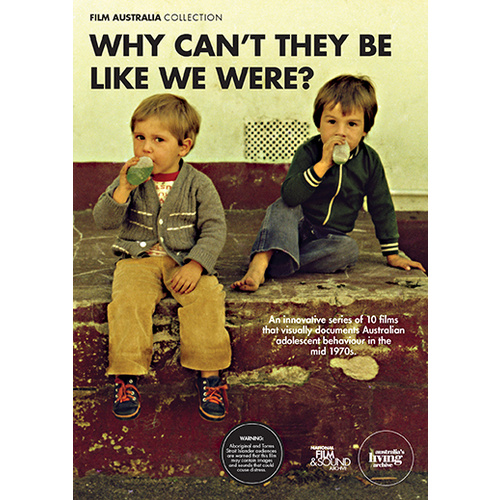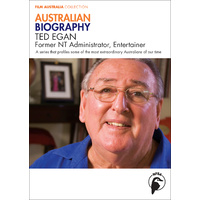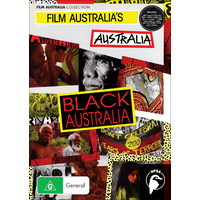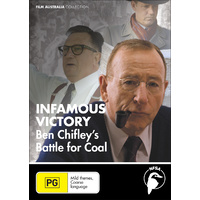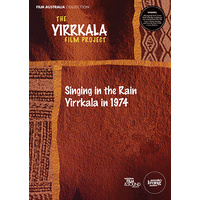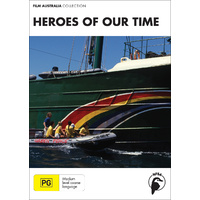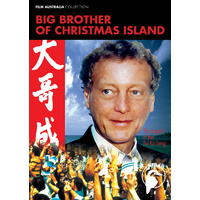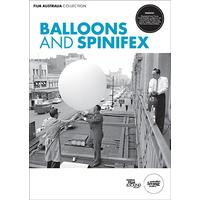1976, Total Running Time 132 Minutes (10 Episodes)
An innovative series of 10 films that visually documents Australian adolescent behaviour in the mid 1970s. Each film is a short 11-15 minute case-study of one or two adolescents between the ages of 14 and 17, who represent a broad and realistic perspective on contemporary adolescent life in Australia.
The films are designed to stimulate discussion on a wide range of general issues. On release these films were one of the most innovative sets of visual documents on Australian adolescent behaviour produced.
EPISODES
Craig and Steve An exploration of the concept of Australian masculinity in the mid 1970s. Craig studies classical ballet and Steve plays Australian Rules football - both strenuous, physically demanding pursuits. In a frank discussion about gender stereotypes, each of them talks about his life, friends and work: Craig dispels the myth about the 'queer' male dancer and Steve disproves the 'dumb' footballer cliché. And to lighten up the discourse actor Reg Livermore demonstrates his point technique dressed in a football guernsey and tutu.
Gary Gary is a troubled teenager who became emotionally withdrawn when his parents separated after years of conflict and domestic violence. After the separation the whole family split up. The oldest son Rick stepped into his father's shoes and became the backbone of the family; Gary went to live with his father and new partner and Karen left home at 19 to live with her boyfriend, after constant fighting and bickering with her mother. The youngest son Bradley is deaf and partially blind and sees his father two afternoons a week and all day Sunday. But is this enough? His father wishes that he could spend more time with the boy, whose disabilities make him particularly vulnerable.
Greg Greg has been given an extraordinary opportunity to follow in his father's footsteps by attending a prestigious private school, something his siblings will miss out on due to the family's economic circumstances. Greg realizes his good fortune and tries to emulate his father and win his approval by training hard to keep his place in the school rowing team, his father's old sport. But is this enough? The film explores the theme of parental expectations and the effect these have on their children's lives, as Greg and his family discuss what his privileged education means in terms of future job opportunities, success and social status.
Kathy and Tracey An exploration of gender stereotyping of Australian girls in the mid 1970s, dealing with the importance of education, job opportunities, parental expectations and the concept of femininity. Kathy left school early when she found it difficult to keep up. She now works in a monotonous job as printer in a bank and would like a change. Tracey left school at 15 to take up fulltime modelling, but has returned after only a few months in the workforce. Although she loves modelling she felt too young to be out in the wide world by herself and she missed the company of her school friends. She hopes to stay and complete her Higher School Certificate.
Mick Mick is seventeen, out of work and has not yet found a productive direction for his life, with a record of assaults and robberies behind him. Tragically, Mick appears to accept that he will go to prison soon. His parents believe that it was his early school environment that traumatised him and turned him bad. Has the detention centre Mick was sent to for earlier offences deterred him from committing any more? This film explores Mick's life, his addiction to the tattoo parlour, his personal problems and the challenges of being young in Mt Druitt.
Niki Niki is 14 - an independent teenager who runs her own life without parental supervision. When she was 12 her parents divorced despite her role as mediator between them. Niki chose to live with her father in a commune and grew up very quickly, experiencing total freedom to do what she liked. However she is aware that with freedom comes responsibility - to wash and iron her uniform, write her own notes and to attend school. Niki sometimes feels alienated, both from the school system, which she thinks treats the students like they were 'vegetables', and from her fellow students who are still rebelling against their parents' strict rules. She firmly believes that if parents gave their children more freedom, they would in turn become more responsible.
Robin Robin is affectionately known to her friends as a 'tank', but in the past she has felt excluded and picked on because she is overweight. This film explores the issues of racial and body discrimination in a typical Australian high school. It also takes a close look at the peer group power structure, to discover how important it is for students to feel accepted and part of a group and how they may act differently towards each other outside of school hours.
Rui Rui and his mates have their own mechanisms for coping with the physical restrictions of their inner-city environment and the lack of children's recreational space. They model their games on TV's SWAT, play pool, protect or throw stones at drunks and ride their bikes on triumphant adventures through storm water drains in Alexandria. As Rui says, "It's a good place around here, really, if you know how to cope with it."
Susan Sixteen year old Susan lives with her parents in a big city's outer suburb. She is trying to discover who she is by rebelling against their rules and values. Susan spends a lot of time with her boyfriend Daryl who she feels understands what she's going through. And she is growing apart from her parents who cannot comprehend her current behaviour. Their arguments about everything - her schoolwork, her attitude towards her teachers, her open talk about sexuality, and her future, often end in tears. Susan wants to be more independent and is thinking of leaving home.
Amy Amy is a 16 year old Aboriginal girl living with her family in Sydney. In 1974 the family moved to Sydney from Collarenebri because of a rural recession and because of the parents' desire to improve the educational opportunities for their children. Amy has left school early and is trying to find work to bridge the gap until she is old enough to train as a nurse. But she is encountering prejudice in her unsuccessful attempts to get a job. The film ends with an intense discussion between Amy, her mother and her grandmother about standing up for yourself in white society.
A Film Australia production in consultation with Social Education Materials Project. © 2011 National Film and Sound Archive of Australia
(002902200)
Directors: Phillip Noyce, Karl McPhee, David Haythornthwaite, Graham Chase, Jan Sharp, Jason Olivier
Producer: Tom Manefield
Year: 1976
Total Running Time: 132 Minutes
Classification: Exempt from classification
Curriculum Links: English K-10 'Popular and Youth Cultures', 'Cultural, Social and Gender Perspectives' ‘Insights into Aboriginal Experiences in Australia’; HSIE; Indigenous Studies; PDHPE; Sociology; SOSE.
SEE ALSO
| SKU | 002902200 |
| Brand | Film Australia |


